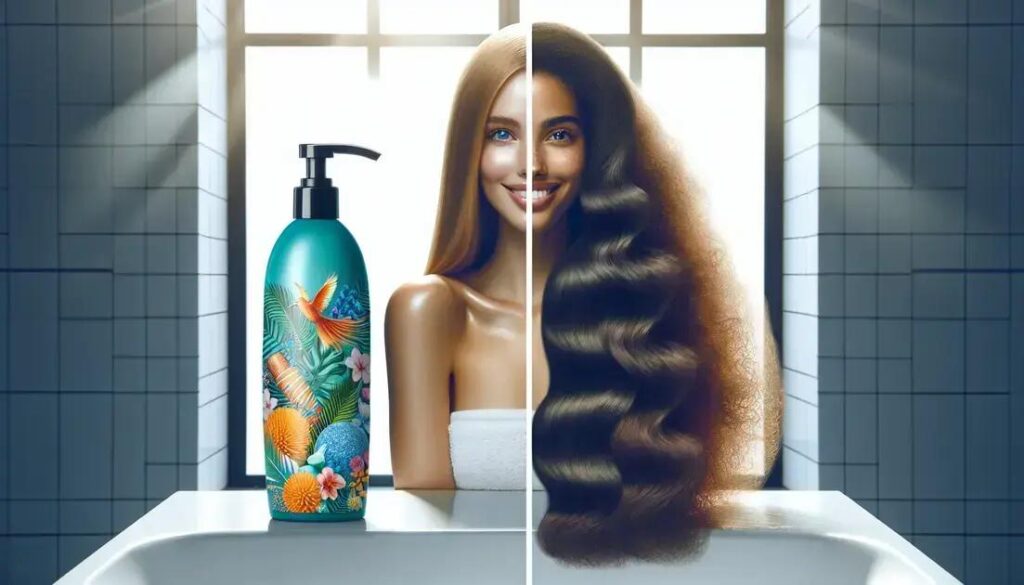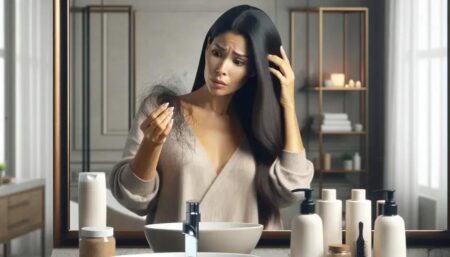Hey there! So, you’ve probably heard the buzz about sulfate-free shampoos, right? But what’s the difference between sulfate-free and regular shampoo, and why should you even care? Well, let me break it down for you. Sulfate-free shampoos are all the rage because they’re gentler on your hair and scalp, which is perfect if you’re dealing with dryness, frizz, or color-treated hair. On the other hand, regular shampoos, which usually contain sulfates, are known for their lathering and deep-cleaning abilities. But here’s the kicker: sulfates can strip your hair of its natural oils, leaving it dry and brittle. So, if you’re wondering whether to make the switch, you’re in the right place. By the end of this post, you’ll have a clear understanding of the pros and cons of each type, and you’ll be able to decide which one fits your hair care routine best. So, stick around, and let’s dive into the world of shampoos together!
Understanding Sulfates: What Are They?
Sulfates are a type of surfactant, which is a fancy way of saying they’re the ingredients in your shampoo that help create that foamy lather we all love. The most common sulfates found in shampoos are sodium lauryl sulfate (SLS) and sodium laureth sulfate (SLES). They’re effective at removing dirt and oil from your hair, but they can also be quite harsh, especially if you have sensitive skin or hair that’s prone to dryness.
Why Are Sulfates Used in Shampoos?
The main reason sulfates are used in shampoos is because they’re great at what they do – cleaning! They help break down oils and dirt, making it easy to wash them away. Plus, they give that satisfying lather that many people associate with cleanliness. However, this cleaning power can come at a cost, especially for those with specific hair types or conditions.
Are Sulfates Bad for Your Hair?
Not necessarily. Sulfates aren’t inherently bad, but they can be too much for certain hair types. If you have oily hair, you might actually benefit from the deep-cleaning properties of sulfates. But if your hair is dry, curly, or color-treated, sulfates might strip away too much of your natural oils, leading to dryness and frizz.
Who Should Avoid Sulfates?
If you have sensitive skin, sulfates might irritate your scalp, causing itchiness or redness. People with color-treated hair might also want to avoid sulfates, as they can cause the color to fade faster. Curly-haired folks might find that sulfates make their hair frizzier, as they remove the natural oils that help define curls.
Alternatives to Sulfates
If you’re looking to avoid sulfates, there are plenty of alternatives out there. Look for shampoos that use gentler surfactants like cocamidopropyl betaine, which is derived from coconut oil and is less likely to strip your hair of its natural oils.
The Benefits of Sulfate-Free Shampoo
Sulfate-free shampoos are designed to be gentler on your hair and scalp. They won’t strip away your natural oils, which means your hair is less likely to become dry and brittle. This makes them a great choice for anyone with dry, damaged, or color-treated hair.
Moisture Retention
One of the biggest benefits of sulfate-free shampoos is that they help your hair retain moisture. This is especially important if you have dry or curly hair, as keeping your hair hydrated is key to maintaining healthy curls and reducing frizz.
Color Protection
If you’ve invested in a gorgeous hair color, the last thing you want is for it to fade quickly. Sulfate-free shampoos are much gentler on color-treated hair, helping to keep your color vibrant for longer.
Reduced Irritation
For those with sensitive skin, sulfate-free shampoos can be a game-changer. They’re less likely to cause irritation or allergic reactions, making them a safer choice for people with sensitive scalps.
Natural Ingredients
Many sulfate-free shampoos are formulated with natural ingredients that can be beneficial for your hair. Look for shampoos with nourishing oils, botanical extracts, and vitamins that can help strengthen and protect your hair.
Environmental Impact
Sulfate-free shampoos are often more environmentally friendly, as they contain fewer harsh chemicals that can end up in our waterways. If you’re looking to make more eco-conscious choices, switching to a sulfate-free shampoo is a great place to start.
Regular Shampoo: When Is It the Right Choice?
Regular shampoos with sulfates aren’t all bad. In fact, they can be perfect for certain hair types and lifestyles. If you have oily hair or use a lot of styling products, you might find that regular shampoos do a better job of removing buildup and leaving your hair feeling clean and fresh.
Deep Cleaning
If you struggle with oily hair or product buildup, a regular shampoo might be just what you need. The sulfates in these shampoos are great at breaking down oils and residues, giving your hair a deep clean.
Budget-Friendly
Regular shampoos are often more affordable than their sulfate-free counterparts. If you’re on a budget, you might appreciate the lower price point of regular shampoos.
Availability
Regular shampoos are widely available and come in a variety of formulations, so you’re sure to find one that suits your needs. Whether you’re looking for a shampoo for oily hair, dandruff, or just a basic clean, there’s likely a regular shampoo out there for you.
Who Should Use Regular Shampoo?
If you have oily hair, you might find that regular shampoos work better for you. They can help remove excess oil and leave your hair feeling fresh and clean. People who use a lot of styling products might also benefit from the deep-cleaning properties of regular shampoos.
Drawbacks of Regular Shampoo
While regular shampoos can be great for some, they do have their downsides. The sulfates in these shampoos can be harsh on your hair and scalp, especially if you have dry or sensitive skin. They can also strip color-treated hair, leading to fading.
Tips for Choosing the Right Shampoo for You
Choosing the right shampoo can feel overwhelming, but it doesn’t have to be. Here are some tips to help you find the perfect match for your hair type and needs.
- Identify Your Hair Type: Is your hair dry, oily, curly, or color-treated? Knowing your hair type will help you narrow down your options.
- Consider Your Scalp: If you have a sensitive scalp, you might want to opt for a sulfate-free shampoo to reduce irritation.
- Think About Your Lifestyle: Do you use a lot of styling products? If so, a regular shampoo might be better for removing buildup.
- Read the Labels: Look for shampoos with ingredients that match your hair needs, such as moisturizing oils or volumizing agents.
- Don’t Be Afraid to Experiment: It might take some trial and error to find the perfect shampoo, so don’t be afraid to try different brands and formulations.
Comparing Sulfate-Free and Regular Shampoos: A Quick Table
| Feature | Sulfate-Free Shampoo | Regular Shampoo |
|---|---|---|
| Moisture Retention | High | Low |
| Color Protection | Good | Poor |
| Scalp Sensitivity | Gentle | Can be Harsh |
| Cleaning Power | Mild | Strong |
| Price | Varies | Generally Lower |
How to Transition to Sulfate-Free Shampoo
If you’ve decided to make the switch to sulfate-free shampoo, here’s a step-by-step guide to help you transition smoothly.
- Start Slowly: Introduce the sulfate-free shampoo gradually, using it once or twice a week at first.
- Use a Clarifying Shampoo: Before making the switch, use a clarifying shampoo to remove any buildup from your hair.
- Be Patient: It might take a few weeks for your hair to adjust to the new shampoo, so be patient and give it time.
- Condition Well: Use a good conditioner to keep your hair hydrated and smooth.
- Monitor Your Hair: Pay attention to how your hair responds and adjust your routine as needed.
Top 10 Sulfate-Free Shampoos to Try
Here are some popular sulfate-free shampoos to consider. Prices and availability may vary, so be sure to check your local stores or online retailers.
- SheaMoisture Coconut & Hibiscus Curl & Shine Shampoo – Great for curly hair, priced around $10.
- OGX Nourishing + Coconut Milk Shampoo – A budget-friendly option, priced around $6.
- Pureology Hydrate Shampoo – Ideal for color-treated hair, priced around $30.
- Maui Moisture Heal & Hydrate + Shea Butter Shampoo – Perfect for dry hair, priced around $8.
- L’Oréal Paris EverPure Sulfate-Free Moisture Shampoo – Affordable and effective, priced around $7.
- Briogeo Be Gentle, Be Kind Avocado + Quinoa Co-Wash – A co-wash option, priced around $32.
- Giovanni Tea Tree Triple Treat Invigorating Shampoo – Refreshing and revitalizing, priced around $8.
- Living Proof Perfect Hair Day Shampoo – For smooth and healthy hair, priced around $28.
- Moroccanoil Moisture Repair Shampoo – Luxurious and nourishing, priced around $24.
- Not Your Mother’s Naturals Tahitian Gardenia Flower & Mango Butter Curl Defining Shampoo – Great for curls, priced around $8.
Frequently Asked Questions
Is sulfate-free shampoo better for everyone?
Not necessarily. While sulfate-free shampoos are gentler and better for certain hair types, regular shampoos might be more effective for others, especially if you have oily hair or use a lot of styling products.
Can sulfate-free shampoos clean hair as well as regular shampoos?
Sulfate-free shampoos can clean your hair effectively, but they might not lather as much as regular shampoos. They’re great for gentle cleansing without stripping your hair of its natural oils.
Will my hair look different if I switch to a sulfate-free shampoo?
It might! Many people notice that their hair feels softer and less frizzy after switching to a sulfate-free shampoo. However, it might take some time for your hair to adjust.
Do sulfate-free shampoos cost more?
They can be more expensive, but there are affordable options available. It’s worth checking out different brands to find one that fits your budget.
How often should I use sulfate-free shampoo?
This depends on your hair type and needs. Some people use it every wash, while others alternate with a regular shampoo. Listen to your hair and see what works best for you.
So there you have it! Whether you choose sulfate-free or regular shampoo, the key is to find what works best for your hair type and lifestyle. Remember, your hair is unique, and what works for someone else might not work for you. Don’t be afraid to experiment and switch things up if needed. If you found this guide helpful, why not share it with a friend who’s also on a hair care journey? And if you have any questions or tips of your own, drop them in the comments below. Happy shampooing!












